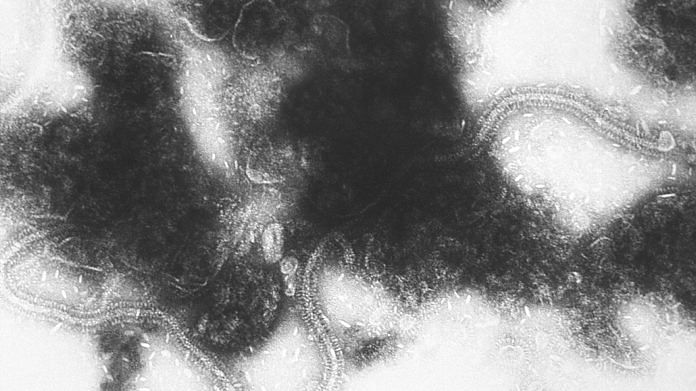New Delhi: Both the US and UK health regulatory authorities Monday authorised vaccines for respiratory syncytial virus (RSV), a lower respiratory tract disease that affects an estimated 64 million people and causes 160,000 deaths each year, according to NIH data.
After decades of disappointments in RSV research, drugmakers made significant progress in 2022 by releasing the first vaccinations against the virus. GlaxoSmithKline and Pfizer received FDA approval in May 2023 for two RSV vaccinations for older individuals. The FDA is anticipated to make a judgement in August on whether to approve Pfizer’s vaccine for pregnant women, with the goal of providing protection to their newborns.
GlaxoSmithKline’s vaccine for RSV was approved by The Medicines and Healthcare products Regulatory Agency (MHRA) in Britain on Monday.
The vaccine for RSV, which has flu-like symptoms and is lethal, mostly for infants and the elderly, has been in the making since the 1960s, but the first breakthrough was made only in 2022, when the researchers working on the vaccine experimented with genetically modified proteins of the RSV virus and were successful in creating an injectable after decades of research.
The injectable has now been approved by the Food and Drug Administration for infants and children under the age of two who are at high risk of severe RSV after a rise in cases last year swamped US hospitals with wheezing children. Pfizer and other pharmaceutical companies are also in the process of developing vaccinations for newborns.
A comparable antibody medication was approved by the FDA more than 20 years ago, but it was exclusively for high-risk babies and required monthly injections, Associated Press reported.
Similar to a polio shot, the RCV vaccine was seen as an antidote but backfired massively, leading to the deaths of the infants and people it was administered to. Then a one-of-a-kind ‘submicroscopic discovery’ in 2013 changed the game and led to a scientific breakthrough that helped jolt the sector back to life, fueling efforts that are finally bearing fruit this year.
A six decade long quest
Following the discovery, Pfizer and GSK were already preparing to compete in the new RSV market. Both businesses came closer to regulatory approvals in November 2022 and finally got the first-ever authorization for an RSV vaccine Monday.
In 2022, two RSV vaccines, one developed by GSK and the other by Pfizer, were seen to have positive effects on older adults in large-scale trials. Separately, in a large trial, a prophylactic injection of a monoclonal antibody created by AstraZeneca and Sanofi gave long-term protection.
In a 2022 report, The Guardian reported how it was a structural biologist named Jason McLellan at the University of Texas at Austin who first discovered the impact of genetically modified versions of the virus, leading to a revelation: ‘One blob looked like a lollipop, the other a golf tee.’
These minute modifications are beginning to significantly alter how vaccines are developed against different infections, according to McLellan.
Since vaccines instruct the immune system to pursue viruses by presenting a version of the virus or a pathogen’s distinguishing trait– for the RSV, it was the F protein. The pathogen’s surface is covered in the F protein, a molecular key that allows the virus to bind to cells and infect them.
However, there was an issue with employing the F protein as the foundation of a vaccine. It is an erratic shapeshifter, and scientists were having difficulty determining what it looked like in its most ephemeral form – before it hooked onto cells.
McLellan used X-ray crystallography to identify the precise form of the F protein, revealing that RSV assumed an illusive lollipop shape before entering cells. After genetic modification, it ended up looking like a golf tee.
McLellan worked with Barney Graham, another viral immunologist, to educate the immune system to look for the lollipop. To accomplish this, scientists would need to figure out how to freeze the F protein into its ephemeral lollipop form.
McLellan used minor chemical changes to mould the F protein into place. He and his colleagues developed more than 150 versions of the F protein. Graham tested that version on mice and monkeys and discovered that it elicited a significant protective immunological response.
William Gruber, senior vice president of vaccine clinical research and development at Pfizer and a 40-year RSV vaccine developer, was the first to know of these developments via Graham, who was his friend.
Graham showed Gruber the protein stabilisation work he and McLellan had done. In June 2022, GSK became the first to show success with an RSV vaccination that included a stabilised F protein, demonstrating the power of adapting vaccines to the structure of the virus.
Pfizer followed in August with positive findings. Johnson & Johnson and Moderna are developing their own RSV vaccinations based on the F protein lollipop.
An effective cure
Nirsevimab, which will be marketed as Beyfortus, is not a vaccine. Vaccines cause the body to produce antibodies in order to defend against infections.
Nirsevimab, on the other hand, is a type of passive immunity. It’s a ready-made antibody capable of binding to the virus and preventing it from infecting healthy cells. The immune system is not required to produce anything, CNN reported.
It is administered to an infant as a single injection before the RSV season, which typically occurs in the autumn and winter months. The FDA approval now permits a second injection for infants up to 24 months old who are still at risk during their second RSV season.
Nirsevimab’s antibody has been stabilised, so it lasts longer in the body — four to six months — and appears to be more powerful and is safe to use in all infants, including healthy full-term babies.
The MHRA also approved GSK’s Arexvy injection for active vaccination against RSV in people 60 and older. Arexvy had received approval from US and European regulators as well.
Also read: LIGO-India — how new observatory will use gravitational waves to unlock mysteries of the cosmos



